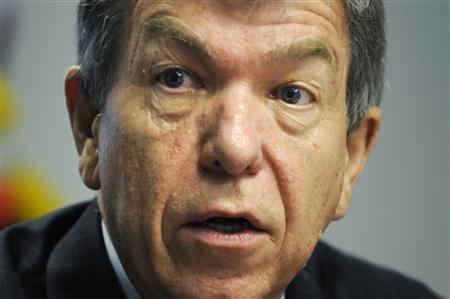(Reuters) – A top Republican lawmaker said Monday it was time for Washington to learn how to compromise again so the country can solve its deepening problems.

“I’m bothered by our politics generally that suggest that if you don’t get exactly what you want, that’s somehow a failure,” said Senator Roy Blunt, a member of his chamber’s Republican leadership and the former second-ranking Republican in the House of Representatives.
Blunt, who is Republican presidential candidate Mitt Romney’s liaison to the Senate, spoke at the Reuters Washington Summit, where political leaders are discussing the pressing issues currently confronting U.S. politicians.
His comments deviated from the standard rhetoric of Washington Republicans these days, many of whom will not even use the word “compromise” anymore for fear of appearing to Tea Party supporters to be backing down on matters of principle. John Boehner, the Speaker of the Republican-controlled House of Representatives, carefully avoids the term, preferring to speak of finding “common ground.”
“I could get in lots of trouble in the current environment saying I think we should have more compromise,” Blunt added. But “what I’ve said about that is what I believe – compromise is the price for living in a democracy.
Former Republican Governor Jeb Bush recently said that his party has moved so far to the right that former President Ronald Reagan, a Republican icon, would feel out of step with it.
“I’m bothered by our politics generally that suggest that if you don’t get exactly what you want that it’s somehow a failure,” Blunt said at the summit held at the Reuters office in Washington.
“The real strength of President Reagan was the ability to explain that if someone was your friend 85 percent of the time, they were not your enemy,” Blunt said.
Reagan cut bipartisan deals with the Democratic speaker of the U.S. House of Representatives, Tip O’Neill. They argued, but considered each other friends and found common ground.
“Governing is never the choice between the perfect and the possible. It is always the choice between the possible and deciding you’d rather not get anything done,” Blunt said.
“There are times that when the possible is so unacceptable that you’re better off saying, ‘I’d just rather walk away and start this fight another day.”
“But most of time in a democracy accepting what is possible and coming back the next day and starting to work for what you couldn’t get is the way to get things done,” he said.
TAXES AND THE DEBT
Current Democratic congressional leaders charge that an anti-tax hike pledge taken by many Republicans, including Blunt, have made it difficult to compromise, particularly on efforts to reduce the record U.S. debt.
Blunt said he had no regrets about having signed the pledge drafted and circulated by Grover Norquist, head of Americans for Tax Reform, an influential conservative advocacy group.
“I really think the (deficit) problem is a spending problem, not a taxing problem,” Blunt said.
Asked if pledge makes it more difficult to compromise, Blunt paused, shrugged and then smiled. “Pledges would make compromise more difficult,” he conceded.
Former U.S. Representative Tom Davis of Virginia, who now heads the centrist Republican Main Street Partnership, said the growing influence of the most partisan elements in both parties had contributed to political gridlock.
“You don’t get rewarded for compromise. You get punished for compromise,” Davis said at the summit.
Economic instability, a failed government response to Hurricane Katrina on the Gulf Coast in 2005 and dissatisfaction with prolonged wars in Iraq and Afghanistan have fed a sense that government no longer works properly, he said.
“These are imminently solvable problems. The body politic has just shown an inability to address them because it is inconvenient to do so and you’ll probably take some hits in doing it,” Davis said. “The party that comes in and cleans this up probably gets voted out of office.”
Democrats and Republicans have accused each other of failing to negotiate in good faith on a number of issues, from student loan interest rates to a sweeping plan to upgrade the nation’s transportation system and create millions of jobs.
Blunt did not point a finger of blame at either side.
“Only in the recent politics of the country has compromise been seen as an evil as opposed to a positive,” he said.
“Governing is never the choice between the perfect and the possible. It is always the choice between the possible and deciding you’d rather not get anything done,” Blunt said.
“There are times that when the possible is so unacceptable that you’re better off saying, ‘I’d just rather walk away and start this fight another day.”
“But most of time in a democracy accepting what is possible and coming back the next day and starting to work for what you couldn’t get is the way to get things done, move the country forward.”
Follow Reuters Summits on Twitter @Reuters_Summits
(Additional reporting by John Whitesides; Editing by Fred Barbash and Anthony Boadle)





